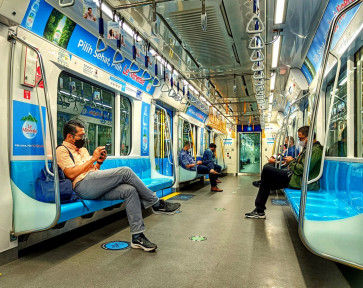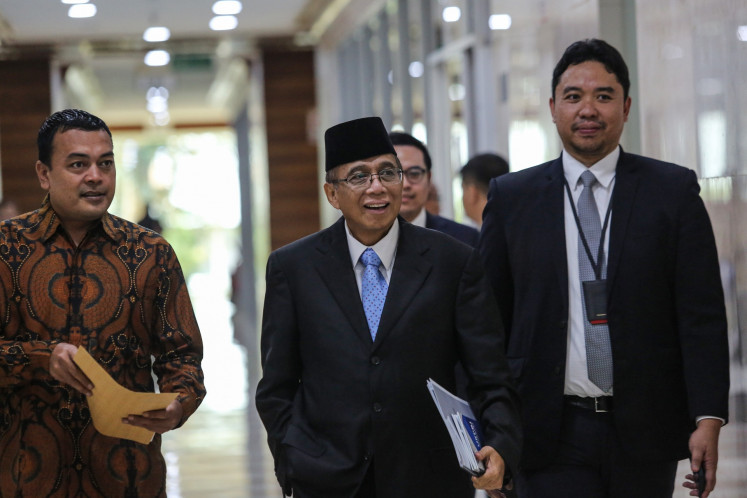Popular Reads
Top Results
Can't find what you're looking for?
View all search resultsPopular Reads
Top Results
Can't find what you're looking for?
View all search resultsPandji Wisaksana: Guiding eyes for the blind
Pandji Wisaksana: JP/Dian KuswandiniPandji Wisaksana once promised himself that someday he would become a doctor so he could cure his father’s blindness
Change text size
Gift Premium Articles
to Anyone
Pandji Wisaksana: JP/Dian Kuswandini
Pandji Wisaksana once promised himself that someday he would become a doctor so he could cure his father’s blindness.
Deep down, he couldn’t bear to see his father shuffling along with the aid of a stick, and unable to read his beloved books. The little boy couldn’t help but think how wonderful it would be if his father could see his children’s faces again.
But life had other things in store for Pandji: It did not give him a single opportunity to achieve his noble ambition. Pandji’s father died long before his son could help him get his sight back, by any means.
“It was wartime; the Japanese [army] closed the schools,” recalls the 84-year-old businessman and philanthropist. “Life was hard after that. I had no choice but to become a merchant.”
But that didn’t mean God refused Pandji’s earnest childhood prayers. Life had a bag full of plans for him, and all Pandji had to do was to wait for the right moment to come.
At 45, his moment finally arrived. A meeting in 1968 with Nani Sadikin, the wife of a former Jakarta governor, led him to help found the Indonesian Eye Bank. Since then, more doors have opened for Pandji to do his bit for the blind and spread the helping spirit among others.
“My chance [of becoming a doctor] might have slipped away,” he says. “But not [my] spirit.”
Pandji’s spirit blossomed after witnessing his father’s struggle to live in the darkness. Phan Jam Soe, who lost his sight after being exposed to chemicals while working at a tin company, had valued life so highly that he never resigned himself to his disability. As his hearing and sense of smell sharpened, Phan could distinguish various types of tobaccos — even bank notes.
“He knew how to distinguish between five gulden and 10 gulden,” Pandji says, adding with a smile, “He could even still recognize his children and friends just from our voices.”
For his father, blindness wasn’t the end of the world. “Blindness didn’t stop my father from enjoying books and newspapers,” Pandji says. “In the evening, he always asked his employees to read books and newspapers to him. He always wanted to know everything from A to Z.”
His father’s resilience inspired Pandji, evoking in him a desire to help others. Little Pandji spent his spare time as a boy scout, learning how to serve others. During his teens, Pandji never left home without a small first aid kit. And when he was 19, this first aid kit proved his social sensibility.
At that time, Pandji was working as a reporter for the Mandarin-language newspaper Bandung Herald; everywhere he went as he reported on the war he came across the wounded. Using his kit, Pandji was able to help them. He also turned his operational car into an “ambulance” and took some people to a hospital.
“After I finished helping the wounded victims, I continued with my reporting job,” says Pandji, who later joined the Red Cross.
The way Pandji sees it, everyone deserves to be helped. Once, he took care of several robbers who were shot after robbing a gold shop. “I didn’t care that they were robbers or anything; if they needed help, then I would help as much as I could.”
All these experiences later made Pandji realize that it isn’t necessary to be a doctor to help others. The range of social services, he says, is wide. “They can be carried out through any means as long as we have the ability to do so.”
For Pandji, his ability to help others meant his successful business gave him the chance to share his fortune with others; it also helped him build a broad network with some influential people who could support his philanthropic activities.
Yes: Philanthropic soul aside, Pandji is a successful businessman with an international reputation. You might remember back in the 1970s using plastic products with the brand “Pioneer”, which carried the logo of a rooster. From pails and hangers to water dippers and combs, Pioneer products dominated local households. In addition to Pioneer, which Pandji established in 1964, he founded other companies, including PT Prakarsa, famous for its plastic pipes, better known today as “pralon pipes”.
Perhaps few people know that Pandji was the man who brought the pralon technology from Japan to Indonesia.
“Before, people [here] used pipes made of iron. Because those pipes rust easily, they affect the water.
“Pralon pipes are as strong as iron pipes; rust-free; light and easy to bond, using only adhesive,” adds Pandji, who donated pipes for the construction of Istiqlal Mosque in Jakarta.
Pandji’s shining reputation as a businessman landed him in several organizations, including the renowned Lions Club, an international service organization operating in some 200 countries. Together with fellow businessmen Suharto Suhandinata and Eddy Kowara, Pandji founded Lions Club Metropolitan Jakarta in 1971. While head of the club’s Blind Welfare Committee, Pandji organized the publication of 300 Braille books and free eye operations. Then, when he was appointed the club’s chairman, Pandji founded a mobile eye clinic — a clinic in an ambulance that carried out medical treatments for people with eye problems. Pandji also launched a phenomenal campaign in Jakarta that distributed 10,000 white sticks for the visually impaired.
“I feel blessed to be able to serve the blind through the organizations that I am involved with,” says Pandji, who served as the former district governor for Lions Club International from 1982 to 1983.
“We’re not God; we can’t help everybody,” he says. So, he adds, “in helping others, we should focus on certain efforts so they can be effective and most of all, meaningful.”
And for Pandji, it’s plain to see that restoring people’s sight has been his main focus. When he got the chance to set up the Indonesian Eye Bank, Pandji felt nothing but gratitude. He traveled to many places — from universities and organizations to religious centers — just to encourage others to donate their eyes after they died. As he points out, even the deceased can make a noble contribution to the needy.
“We won’t need our eyes after we die,” says Pandji, an eye donor himself. “So, why not donate them to the blind? Imagine being able to give a second life to a blind person; imagine you can help them see the world.
“They can work again for their families, and … wouldn’t it be amazing for them to see their families’ faces again?”
Pandji smiles. And we know what he’s talking about; we know that was exactly what he felt as a boy when he thought about his late blind father.










